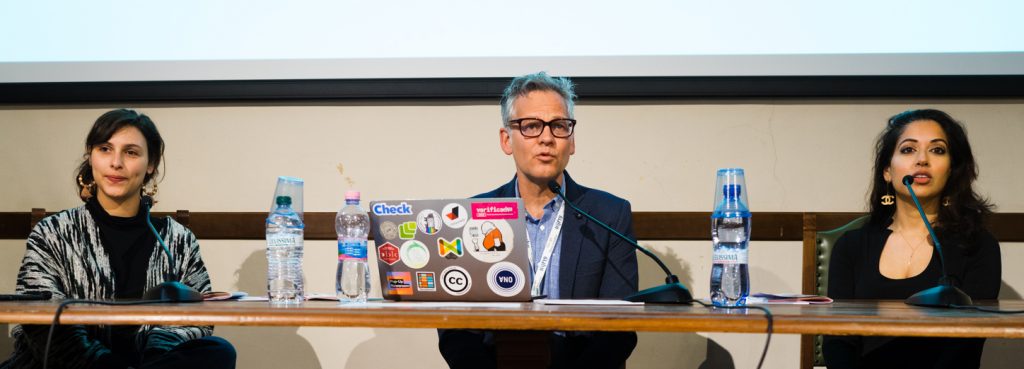Stay up to date by subscribing to our Newsletter or by following our Telegram channel, and join the conversation on Facebook, Twitter, and Instagram.
Edited by Marco Nurra
Watch all #ijf19 sessions on-demand: media.journalismfestival.com
Firehosing: the systemic strategy that anti-vaxxers are using to spread misinformation. Firehosing relies on pushing out as many lies as possible as frequently as possible. That’s typical for propaganda, but the aspect that makes firehosing a unique strategy is that it doesn’t require the propagandist to make the lies believable. That seems counterintuitive, but firehosing is effective because its goal isn’t to persuade. It’s to rob facts of their power. Firehosing inundates us with so many wild opinions that it becomes exhausting to continually disprove them. In this scenario, reality is reduced to positioning and who can sell their position best.
A Congolese journalist who had been raising awareness about the Ebola virus in the Democratic Republic of Congo has been killed at his home. DR Congo is experiencing the world’s second-worst Ebola epidemic on record. People working to stop the virus are often targeted. The violence is thought to be fuelled by the belief among many people that the virus is not real, which can lead to mistrust of those working in the sector. Some people even feel Ebola is a hoax created by medics to get well-paid jobs.
The worst countries in the world at prosecuting journalist murderers. CPJ released the 2019 edition of its annual Global Impunity Index this week, which lists the worst countries in the world at prosecuting murderers of journalists. Somalia tops the list for the fifth year in a row. During the 10-year period covered by the index, 318 journalists were murdered for their work worldwide. In 86% of those cases, no perpetrators have been successfully convicted.
With focus on impunity, ‘10 Most Urgent’ list draws attention to 4 murdered journalists whose cases demand justice. The One Free Press Coalition chose to focus on impunity in the ninth-monthly list of ’10 Most Urgent’ cases of injustice against the press. Several names below—press practitioners, some who are deceased, some who are living through threats and violence—reflect the danger of the profession, worse in some regions than others.
‘When journalists are targeted, societies as a whole, pay a price’: UN chief. A new study from the UN Educational, Scientific and Cultural Organization, UNESCO, underscores the risks that journalists face, showing that almost 90 per cent of those found responsible for the deaths of more than 1,100 of them, between 2006 and 2018, have not been convicted.
‘Extreme fear and self-censorship’: media freedom under threat in Pakistan. Journalists face blanked-out articles, pulled funding and channel shutdown if they dare to criticise the state.
Yemen’s dirty war: A Q&A with Pulitzer winner Maggie Michael. “It started with extensive research, as we needed to build on what was already reported — not just start from scratch. Then we dug for sources and began to move out into those corresponding circles, including researchers, think tanks, activists, and local reporters. The second circle was shaped by former officials, friends, relatives, family members. The third circle was people who were directly involved in the story, so those who had first-hand accounts of what we were looking for — a victim or someone directly involved in abuses, a witness, or an official in charge.”
These hugely popular local news sites in the US and Canada are fake. A network of fake local news sites in Albany, Edmonton and elsewhere generated millions of pageviews as part of an ad fraud scheme, researchers say.
Twitter chose to ban political ads. But pressuring Facebook to do the same could backfire. Banning political ads wouldn’t be the end of the world for Facebook, but strategists warn it could hurt all non-establishment and small candidates.
When a newspaper struggles, you don’t have to close it — you can give it to its community. In Quebec, a community facing the death of its local paper instead worked together to rebuild it as a community nonprofit.
The International Journalism Festival #ijf19 On-Demand
Every week, one recommendation from the extensive programme of the last edition of the International Journalism Festival.

Today we are inviting you to watch “Vaccinating against misinfodemics: journalists and public health misinformation“. In the field of global health, information quality crises can quickly escalate into public health crises, with grave consequences for both population health and trust in institutions more broadly. Widening fears of vaccinations, diagnostic processes, treatments and interventions, based on misinterpretations and successive sharing of low-credibility content about health online leads to distrust not only between doctors and patients, but between communities and health information authorities. The role of strong journalism in health emergencies, as well as quality reporting about new and emerging health research, is essential for mitigating the risks of health misinformation; and this has far-reaching effects.

